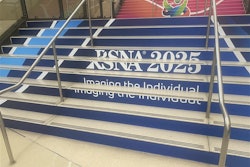An AI-powered workflow algorithm could help deliver equitable care to women seeking breast cancer screening, suggest findings published November 17 in Nature Health.
The algorithm increased breast cancer detection and mitigated disparities tied to race and breast density, according to results reported by Edgar Wakelin, PhD, from DeepHealth in Somerville, MA, and colleagues.
“These results demonstrate that the multistage AI-driven workflow can provide significant and equitable cancer detection benefits to women,” the study authors wrote.
The researchers evaluated the real-world deployment and clinical use of DeepHealth’s AI-driven workflow. The study took place at five practices across the U.S., which included 109 sites and 96 radiologists. The team named its study “AI-Supported Safeguard Review Evaluation (ASSURE).” The workflow is also compatible with digital breast tomosynthesis (DBT) exams.
The researchers stratified clinical outcomes by breast density and racial subgroups to find out whether outcomes are equitable across patient groups. When the AI workflow identified at-risk cases, breast radiologists provided additional review.
The team separated women into two groups, including one where the AI-driven workflow was used (n = 208,891) and the other where standard of care was employed (n = 370,692).
The AI-driven workflow resulted in increases in cancer detection, recall rate, and positive predictive value (PPV).
Comparison between AI-driven workflow, standard of care | |||
Measure | Standard of care | AI-driven workflow | p-value |
Cancer detection rate (per 1,000 exams) | 4.6 | 5 | 0.001 |
Recall rate | 10.6% | 11.1% | 0.015 |
PPV | 4.4% | 5% | 0.001 |
The team also highlighted that the cancer detection rate increased between 20.4% and 22.7% and reported no disparities across racial and density subpopulations with use of the AI workflow.
The results show that when demographic and radiologist-level factors are controlled, “the relationship between the multistage AI-driven workflow and cancer detection rate, recall rate, and PPV is similar for all subpopulations,” the authors wrote.
“By increasing the cancer detection rate, our study suggests that the multistage AI-driven workflow may facilitate the detection of cancers in earlier screening exams for racial and ethnic minorities, a population that has historically faced breast cancer diagnosis at later stages with worse morbidity and mortality,” they added.
Read the full study here.




















